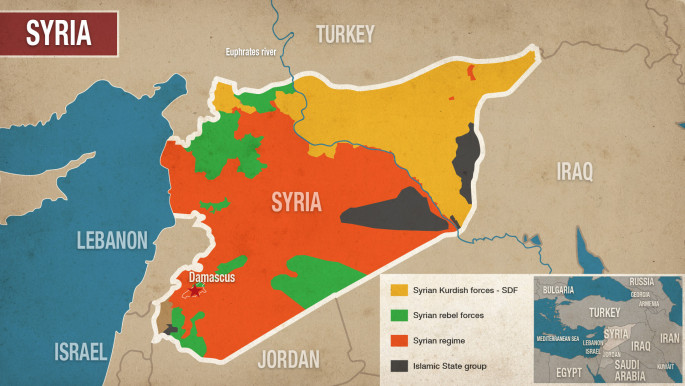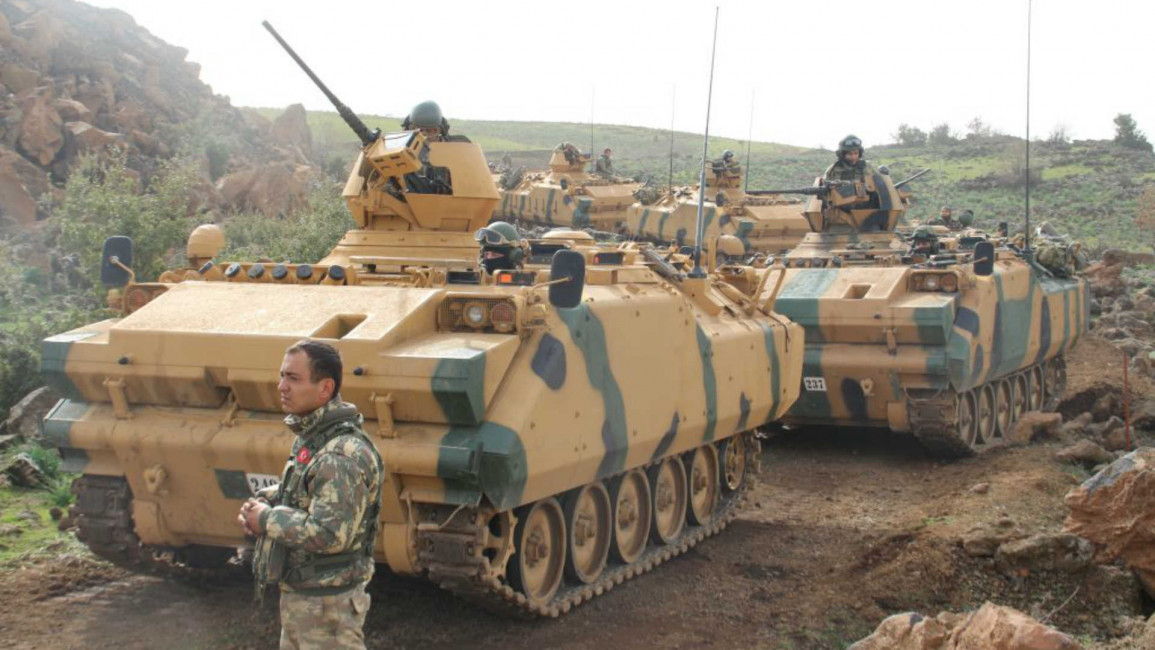
Turkey's Afrin offensive is not about Islamic State
This attack, comprising Turkish forces and allied Syrian rebel groups, had been hinted at extensively. It follows other recent Turkish operations inside Syria, including the Euphrates Shield campaign, in which Turkish forces and allied Free Syrian Army (FSA) units captured large amounts of territory from the Islamic State group (IS), and a Turkish-led move into Idlib last year.
The situation in Afrin is unfortunate and, at least nominally, confused. The YPG, as part of the Syrian Democratic Forces (SDF) umbrella, is part of the international coalition to defeat IS, and a prime proxy of the United States.
Turkey, a fellow member of NATO, is effectively attacking its American ally's "boots on the ground" in Syria.
This Turkish-supported attack on Afrin is a problem - it solidifies a fracturing of alliances and puts great pressure on the predominantly Kurdish local population for little long-term benefit.
But this is not to say that it was an entirely unthinking act, devoid of strategic thought and carried out with capricious randomness.
Many factors have combined to create the unfortunate situation in which a Turkish attack on Afrin seemed reasonable. This is the climate in which the attack took place.
The rhetoric surrounding the Turkish campaign demonstrates a salient fact: That the Syrian war is now dominated by an obsessive focus, by all combatants, on using the language of fighting IS.
 |
The Syrian war is now dominated by an obsessive focus, by all combatants, on using the language of fighting IS |  |
Since defeating IS is the only thing upon which various parties can appear to agree, its spectre is invoked frequently, even when not necessary, or indeed accurate. IS is brought up to justify certain strategic pursuits and to garnish less than spotless operations with much-needed respectability.
The monomaniacal focus on IS has led to nations spreading outright untruths about their activities in Syria, and makes it more difficult to account for what exactly external actors are doing inside Syria.
The Turks justified their attack on Afrin by claiming to be attacking both Kurdish forces and IS. But this is a fiction, as IS is simply not present in this area. Nevertheless, the regime, the Russians, and also the Americans have pushed the idea that, to be able to justify military action at all, it must in some way be linked to IS. Hence the Turkish obeisance to the anti-IS cause.
Binali Yildirim, Turkey's prime minister, said that the object of the operation in Afrin was to "eliminate the PYD [the YPG's political wing] and PKK [Kurdistan Workers' Party] and Daesh [IS] elements" in the city and nearby areas.
The Turkish state-run Anadolu Agency even appeared to allege that the YPG was releasing IS prisoners under the condition that they fought incoming Turkish and rebel forces. This is a ludicrous suggestion.
 |
|
| [Click to enlarge] |
But we cannot be entirely distracted by this propaganda.
This is not to say that the Turkish case has no reflexive merit. Its leaders are understandably worried about the state of Syria, and believe direct intervention is a way to stabilise the northernmost parts of Turkey's southern neighbour.
The primary reason for this is the collapse of the regime of Bashar al-Assad, which is unable to stabilise the country, so much so that other, external, forces have filled the gap.
Turkey, not unreasonably, worries about its border, and feels the need to deploy troops and friendly rebel groups to create buffer zones between its territory and the territory of unfriendly groups, such as the YPG.
 |
The Russians have performed a diplomatic manoeuvre which effectively played Turkey and the Kurds off against each other |  |
It also has an understandable fear of the YPG, which is politically linked to the PKK, an internationally recognised terrorist organisation which has committed acts of great violence inside Turkey. Indeed, the PKK would very much like to occupy territory in northern Syria that might serve as a base for future attacks on the Turkish state.
The US secretary of defence James Mattis endorsed the logic employed by Turkish officials. He noted that the retreat of IS "does not remove many of Turkey's concerns". He said it was "easy to understand" the fears of Turkey's leaders.
Mattis also added some perspective. "Turkey is a NATO ally. It's the only NATO country with an active insurgency inside its borders. And Turkey has legitimate security concerns."
For Turkey, this fear is real; and it is in that sense understandable. But the justification which Turkey offered - that it was fighting IS as well as the YPG - is untrue and thus entirely unsatisfactory.
But the Afrin campaign is also built on something else - the successful diplomatic triangulation of another power: Russia.
For years, Russia has been one of the most consistent external actors in Syria.
Read more: Erdogan: Turkey will not step back from Afrin operation
Despite certain rhetorical suggestions, for example that the Russian military might end its aerial campaign to prop up the Assad regime, its air force has continued to bomb opposition towns and villages, and Russian troops have remained on the streets of Latakia and Damascus.
But as regards the north of the country, the Russians have performed a diplomatic manoeuvre which effectively played Turkey and the Kurds off against each other. Russian diplomats set about ingratiating themselves with each in turn - offering to arm the Kurds, for example, potentially to wean the YPG off its American ally.
The not-too-hidden subtext of this manoeuvre was that the Americans could not be trusted. But now, it is Russia who appears to have abandoned the YPG, allowing the Turkish operation to proceed.
 |
The chaos inside Syria has created a situation in which Turkey feels not only justified but impelled to act |  |
The YPG has appealed to its international allies, but this is to no avail. The American unwillingness to sponsor long-term local governance in Syria has led to over-reliance on an over-stretching of the SDF.
But it also caused fear in Ankara which cannot, at least now, be suppressed. And Syrian rebel factions, which are reliant on Turkish support (of the sort they received during Operation Euphrates Shield and the recent Idlib offensive) are even apparently happy to fight Turkish battles in Afrin.
The chaos inside Syria has created a situation in which Turkey feels not only justified but impelled to act. And while it does so with the tacit support of Russia and the United States, the YPG cannot but feel justified in experiencing a sense of betrayal, which can, with justification, be blamed on the world at large.
James Snell is a writer whose work has appeared in numerous international publications including The Telegraph, Prospect, National Review, NOW News, Middle East Eye and History Today.
Follow him on Twitter: @James_P_Snell
Opinions expressed in this article remain those of the author and do not necessarily represent those of The New Arab, its editorial board or staff.




